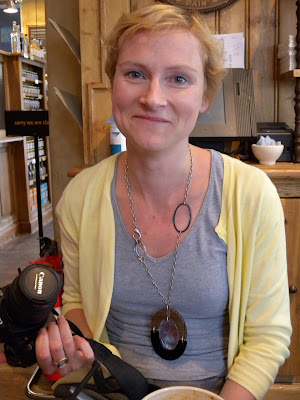 I meet Olivia for lunch in central London. She is a 35 year old consultant who lives and works in London. She describes herself as an amateur photographer having started taking pictures at the age of 8. Her parents were into photography and so there were always cameras lying around the house. She says that she came from “a family of photographers” because her parents were always taking photos. To stop her playing with the expensive SLRs she was given a point and shoot camera and since then she has always been interested in photography. Although she can’t remember her first camera, since then she has always had a Canon. When she upgraded to digital she chose Canon over Nikon because “The guy in the shop said they were much of a muchness and to go for whichever one felt best. The Nikon was chunkier and heavier. Canon felt nicer and I preferred the interface so I went for Canon.” Her opinion of Nikon is that “they have a reputation for being robust and well-made – a lot of professionals use them.”
I meet Olivia for lunch in central London. She is a 35 year old consultant who lives and works in London. She describes herself as an amateur photographer having started taking pictures at the age of 8. Her parents were into photography and so there were always cameras lying around the house. She says that she came from “a family of photographers” because her parents were always taking photos. To stop her playing with the expensive SLRs she was given a point and shoot camera and since then she has always been interested in photography. Although she can’t remember her first camera, since then she has always had a Canon. When she upgraded to digital she chose Canon over Nikon because “The guy in the shop said they were much of a muchness and to go for whichever one felt best. The Nikon was chunkier and heavier. Canon felt nicer and I preferred the interface so I went for Canon.” Her opinion of Nikon is that “they have a reputation for being robust and well-made – a lot of professionals use them.”She likes to travel quite a lot and begins to tell me all the places that she has been to. It is clear that taking photographs is really important to her when she is travelling. She tells me the story of when her camera broke:
“Whilst on holiday in Morocco my camera broke. I felt lost. Photography enhances your experience. Instead of just wandering through somewhere it makes you notice things. The Japanese photographer Araki said ‘I am the camera, photography is the action’. And I really relate to this. I was still walking around as a though I had a camera I just wasn’t able to take any photos. It felt like a lost opportunity, a lost moment.”
Photographs allow her to tell stories of her travels. She says that “photos define the trip”. Without the photos of Morocco she feels like “There’s a part of my trip missing”. I get the impression that without the photos she thinks she may as well not have been there. She tries to describe why she feels the need to take photos and recalls what someone once wrote about poetry “It’s emotional urgency – you get a feeling and you have to express it.” So taking photos for her is a way of expressing herself. She pulls out a book she has been reading as part of her photography course at St. Martin’s and reads me a quote:
“At our best and most fortunate we make pictures because of what stands in front of the camera, to honour what is greater and more interesting than we are. We never accomplish this perfectly, though in return we are given something perfect – a sense of inclusion.”
We start discussing what makes a good photographer. For Olivia “What he/she is able to see… the ability to see things that others can’t. When someone takes a photo they are saying ‘This is my view of the world’. It’s an expression of yourself.” The ideal camera “Allows you to realise your vision and is easy to do so. It’s the end product that’s important, not the method.”
She likes to upload photos onto Flickr but only selects her best. So I ask her how she decides what is a good photo and what isn’t, “When I look at a good photo there is a moment of recognition that triggers something inside you. It creates emotional resonance.” Ultimately she says it doesn’t matter what camera you use because “It’s the photographer not the camera. The camera is just the tool to capture their vision.”
Insights:
• Having a camera in your hand makes you more aware of the world around you.
• Taking photographs allows you to relive moments and recount stories of your experiences.
• A good photo triggers something inside you and creates an emotional resonance.
No comments:
Post a Comment